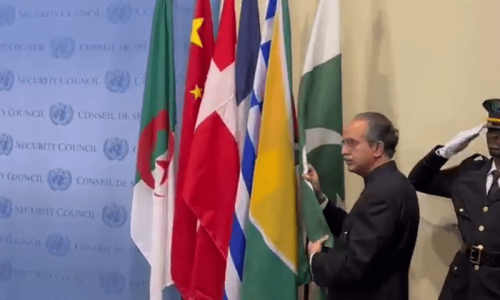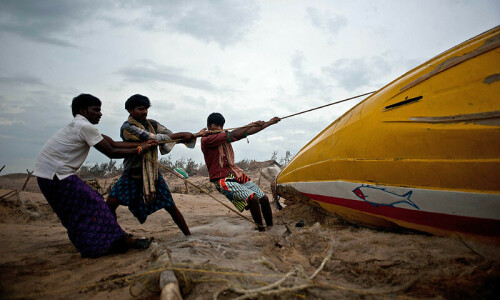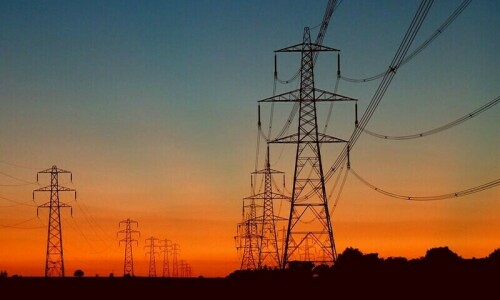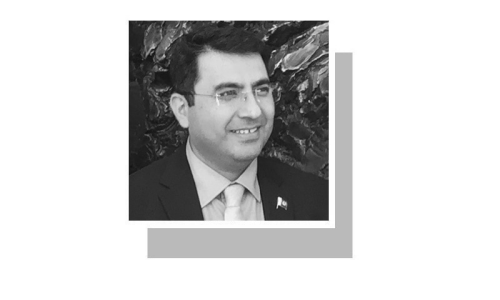A MONTH or so ago, political economist Akbar Zaidi published a piece in Economic and Political Weekly calling for a revision in our academic understanding of state and society in Pakistan. A fundamental question emerging from that discussion, and one that hasn’t been asked, not directly in any case, for sometime now, is ‘who wields political power in Pakistan?’
In the first two and a half decades after independence, the answer was fairly straightforward. The civil-military bureaucracy was in the driving seat, the landed elite was an intermediate force, and the major business families were junior partners. All of this has changed since the late ’60s and early ’70s when the advent of mass politics through social movements, and finally a general election, first introduced new political stakeholders.
The prevailing opinion though seems to suggest that ‘the same characters’ have been in power since 1947, (naturally) at the expense of the common man. This assertion may be true in the sense that working class individuals have never been overt or covert beneficiaries of political power, but it’s false as far as access to power for many other characters — especially those quickest to take on the common man label — is concerned.
Regardless of popular opinion, the composition of our politically affluent class has drastically changed since those first two decades after independence, and this process of change continues to exhibit significant fluidity.
While the civil and military bureaucracy, and part of the landed elite, remain a permanent fixture, urbanisation in Punjab and to a lesser extent in other provinces, has led to the political consolidation of businessmen. Industrialists running large-scale manufacturing concerns have regained their status as beneficiaries of government largesse, as have money-changers, stock-market manipulators, and organised groups in the retail/wholesale sector.
Despite their cries of anguish over load-shedding, taxation, and infrastructure, business owners, and their many lobbying associations, get their way with the state more often than not. It also helps that many of them have initiated political careers on the side, thus ensuring a close link with state power at every level.
Another emergent group, and this one’s a standout feature from the last two decades or so, has been urban professionals. Media personnel, lawyers, doctors, bankers, development sector workers, and other assorted members from this particular societal section, have suddenly become active arbiters and in some cases, the most powerful ones, on several social and political issues.
The lawyers were instrumental in building a corporatist movement around the autonomy of the judiciary and since then have been seen rallying against allegedly blasphemous videos and politicians; media personnel have utilised cable television pulpits to induce shifts in public opinion on issues such as democracy and Sharia; while bankers and corporate professionals have suddenly become indispensable technocratic resources (as the Privatisation Commission and Board of Investment will testify).
Those smart enough to play their cards right end up with a government office — an advisory, ambassadorship, or a ministry of some kind. One particular professional exhibited such dexterity that he vacationed in the Prime Minister’s Office for a while before exiting without much of a trace (or memory).
The third cabal joining the rank of those holding sway is organised religious actors. Much has been written about their power to sway policy and discourse around issues of women, minority rights, and this recent CII proclamation on child marriage is merely another demonstration of their claims to power.
In consequence of these attempts to wield political power through puritanical standards of public morality and religion, they’ve opened up the door for the militant right, which holds entire sects hostage, and seeks to reshape the state and radically redefine the practice of politics.
What’s important to take from all this is that the emergence of these new groups has placed countless strains on the fabric of the state. Power is fractured between multiple claimants, and tussles take place in several domains.
The most obvious domain is that of service delivery — where does a road get built; which neighbourhood gets a new water supply; which denomination gets a government-sponsored mosque allotment. These battles are then simultaneously replicated in the domain of government policy — does the government increase taxes to meet its own revenue requirement, or give tax exemptions to businesses; does it maintain the legal age for marriage, or give in to the demands of the religious groups?
Finally, and perhaps most worryingly, there is a struggle over the exercise of violence itself, best exemplified by the rise of Islamic militancy across the country. While the Pakistan military continues in its role as the most powerful actor in the country, especially in relation to other societal groups, its monopoly over violence, and to a lesser extent its hegemonic status as a state institution, has been compromised over time — not least by its own actions and policies.
In the face of meagre resources, and an incredibly fragmented polity, the ability of various state institutions to retain autonomy of action, and balance out aspirants to power against each other, has withered away. Those who profess a static reading of Pakistani politics are mostly incorrect. The country has changed considerably, the composition of its power elite has changed, and socio-economic and cultural transformations have produced new groups with lofty aspirations to power.
Whether these changes represent something positive though is a different question, and one that appears
increasingly unlikely to yield an affirmative response.
The writer is a freelance columnist.











































